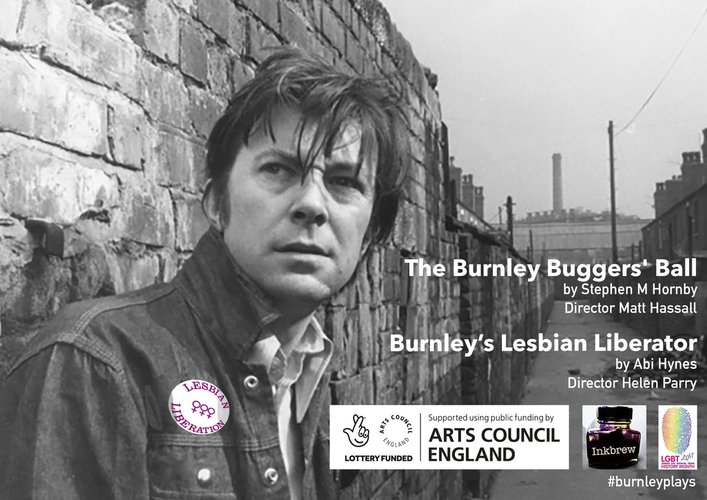
In the 1970s, Burnley was the UK’s battleground for gay and lesbian rights, with two ground-breaking public struggles at either end of the decade. To mark the 50th anniversary of the Sexual Offences Act (1967), LGBT History Month has commissioned two brilliant new dramas from Inkbrew Productions to recreate this amazing forgotten history. Both plays, funded by the Arts Council of England and private patrons, will be performed in February 2017 at the original sites of the events in Burnley and as a showcase in Manchester.
The two plays will be performed as a double bill created with professional actors, writers and directors working with volunteers and a series of local community partners: Burnley Youth Theatre, Lancs LGBT, Burnley Mechanics, Burnley & Pendle Libraries and Hidden Histories. This will be a unique collaborative project for Burnley and a first for LGBT History Month nationally.
The Burnley Buggers’ Ball, by award-winning playwright Stephen M Hornby, tells the story of a transformative public meeting held at Burnley Central Library in 1971. The meeting was about the right to open the first ever LGBT centre in old Co-Operative Society premises, and saw activists in London join forces with activists from the North West to take on the Establishment.
Burnley’s Lesbian Liberator, by Abi Hynes, dramatises the political activism of Mary Winter, a bus driver sacked for nothing more than wearing a ‘Lesbian Liberation’ badge and unsupported by her trade union. She fought back against her employers in 1978 using a network of women’s groups across the UK, and staging a demo outside the Burnley Bus Station.
Russell T Davies, the TV writer and producer famous for Doctor Who and Queer As Folk,is a patron of the project and said: “This is precisely what LGBT History Month should be doing, uncovering hidden history, finding great stories and bringing them to life again for new audiences. And who knew they'd both be about Burnley! It's marvellous to think of this mill town in East Lancashire being the centre of the struggle for UK gay and lesbian rights in the 1970s.”
Professor Sue Sanders, National Chair of LGBT History Month said: “These are two little known but crucial events in UK LGBT history. These are the watershed moments of resistance, of self-assertion and collective organisation. These are the moments when we as a community first stood up in public and said, ‘NO’. Our work is to unbury these stories that prove that as a community we have been active, aware and clear about the work that needs to be done to ensure both individual rights and civil rights. The dramatisation of these stories brings to life the struggle that all minority communities have gone through to gain their rights.”
The plays will be staged at Burnley Central Library on 18th and 25th of February 2017 at 12 noon and 2pm. Each performance lasts approximately 75 minutes and is free on a ‘first come, first served’ basis. The showcase performance is at the Martin Harris Centre in Manchester on 24th February at 7.30pm. Tickets are £8/£5 concession available on the door or in advance from the Centre.
(See interview on Home Page for Ray's comments about Burnley!)
The two plays will be performed as a double bill created with professional actors, writers and directors working with volunteers and a series of local community partners: Burnley Youth Theatre, Lancs LGBT, Burnley Mechanics, Burnley & Pendle Libraries and Hidden Histories. This will be a unique collaborative project for Burnley and a first for LGBT History Month nationally.
The Burnley Buggers’ Ball, by award-winning playwright Stephen M Hornby, tells the story of a transformative public meeting held at Burnley Central Library in 1971. The meeting was about the right to open the first ever LGBT centre in old Co-Operative Society premises, and saw activists in London join forces with activists from the North West to take on the Establishment.
Burnley’s Lesbian Liberator, by Abi Hynes, dramatises the political activism of Mary Winter, a bus driver sacked for nothing more than wearing a ‘Lesbian Liberation’ badge and unsupported by her trade union. She fought back against her employers in 1978 using a network of women’s groups across the UK, and staging a demo outside the Burnley Bus Station.
Russell T Davies, the TV writer and producer famous for Doctor Who and Queer As Folk,is a patron of the project and said: “This is precisely what LGBT History Month should be doing, uncovering hidden history, finding great stories and bringing them to life again for new audiences. And who knew they'd both be about Burnley! It's marvellous to think of this mill town in East Lancashire being the centre of the struggle for UK gay and lesbian rights in the 1970s.”
Professor Sue Sanders, National Chair of LGBT History Month said: “These are two little known but crucial events in UK LGBT history. These are the watershed moments of resistance, of self-assertion and collective organisation. These are the moments when we as a community first stood up in public and said, ‘NO’. Our work is to unbury these stories that prove that as a community we have been active, aware and clear about the work that needs to be done to ensure both individual rights and civil rights. The dramatisation of these stories brings to life the struggle that all minority communities have gone through to gain their rights.”
The plays will be staged at Burnley Central Library on 18th and 25th of February 2017 at 12 noon and 2pm. Each performance lasts approximately 75 minutes and is free on a ‘first come, first served’ basis. The showcase performance is at the Martin Harris Centre in Manchester on 24th February at 7.30pm. Tickets are £8/£5 concession available on the door or in advance from the Centre.
(See interview on Home Page for Ray's comments about Burnley!)
 RSS Feed
RSS Feed